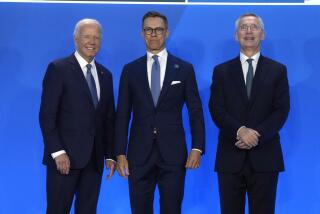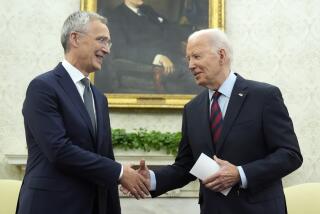NATO Defense Chiefs Agree to Bolster Arsenal
- Share via
MONTEREY, Calif. — NATO’s defense ministers today ended three days of talks on nuclear weapons policy, resolving to upgrade the alliance’s remaining arsenal after the United States and Soviet Union dismantle their mid-range missiles.
Defense Secretary Caspar W. Weinberger said NATO’s military leaders agreed unanimously to maintain an effective nuclear deterrent to a possible Soviet attack.
Although specific changes in the nuclear arsenal will not be decided until the next meeting of the Nuclear Planning Group in six months, the ministers agreed to improve the accuracy and survivability of weapons unaffected by the proposed U.S.-Soviet pact.
The treaty, which would eliminate U.S. Tomahawk cruise missiles and Pershing 2 missiles along with comparable Soviet weapons, is expected to be signed by President Reagan and Soviet leader Mikhail S. Gorbachev on Dec. 7.
However, Weinberger said, NATO won’t abide by the treaty until it is ratified by the Senate. Belgium and the Netherlands were among several allies who wanted compliance with the treaty to begin next month.
The ministers also agreed that NATO’s conventional forces must be bolstered to offset Soviet troop and tank superiority. Decisions on those issues will be made by a different NATO planning group.
“We have not had significant disagreement on any major policy issue,” Weinberger said.
More to Read
Sign up for Essential California
The most important California stories and recommendations in your inbox every morning.
You may occasionally receive promotional content from the Los Angeles Times.













